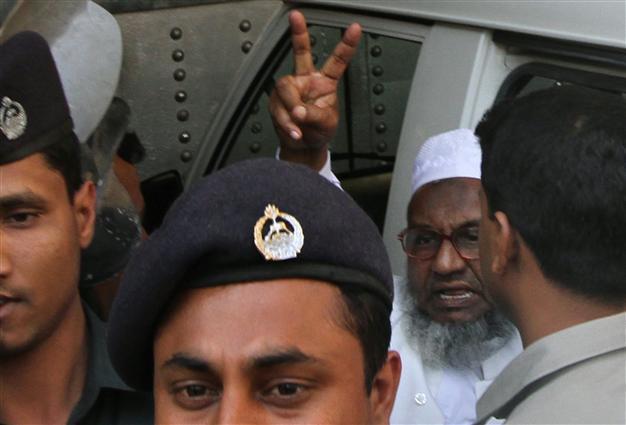Bangladesh executes opposition leader Abdul Quader Mollah
DHAKA - The Associated Press

n this photograph taken on Feb. 5 Abdul Quader Molla, 64, the fourth-highest ranked leader of the Jamaat-e-Islami party, gestures at the central jail in Dhaka
Bangladesh has executed an opposition leader convicted of war crimes hours after the Supreme Court rejected a last-minute appeal.
An intelligence official says the hanging of Abdul Quader Mollah took place on the night of Dec. 12 in a jail in Dhaka. He spoke on condition of anonymity because of the sensitivity of the case.
Several TV stations also reported the execution.
Mollah, 65, is the first person executed after Prime Minister Sheikh Hasina in 2010 began trials for those suspected of crimes during the country's nine-month fight for independence from Pakistan in 1971. The government says Pakistani soldiers, aided by local collaborators, killed 3 million people and raped 200,000 women during the war. Most of the defendants are opposition members.
Mollah's Jamaat-e-Islami party said the death sentence was politically motivated, and warned of "dire consequences" if he were executed.
Turkish officials had voiced strong concerns over his “possible execution”, stressing that such a penalty would “not heal the wounds of the past.”
“We are concerned about the possible execution of a death penalty sentence against the Jamaat-e-Islami leader, Abdul Quader Mollah. We are concerned that the execution of this penalty will lead to an escalation of tension in Bangladesh,” the Foreign Ministry said Dec. 12. Foreign Minister Ahmet Davutoğlu also told reporters during his visit to Armenia that he conducted talks with his Saudi counterpart to stop Mollah's execution.
Prime Minister Recep Tayyip Erdoğan reportedly called Hasina to express his concerns regarding the ruling.
In February, a special tribunal convicted Mollah of killing a student and a family of 11, and of aiding Pakistani troops in killing 369 other people in the war. He was sentenced to life in prison, but the Supreme Court changed that to a death sentence in September.
Until it gained independence in 1971, Bangladesh was the eastern wing of Pakistan. Mollah's party campaigned against independence.
His execution had been placed on hold Dec. 10 night just before he originally was to have been put to death, but the court rejected his final appeal.
Earlier Dec. 12, party activists clashed with police, torching or smashing vehicles and setting off homemade bombs in the cities of Chittagong, Sylhet and Rajshahi, TV stations reported. Scores of people were injured in the South Asian country, which has seen weeks of escalating tension as it struggles to overcome extreme poverty and rancorous politics.
Security officials opened fire to disperse opposition activists in eastern Bangladesh, leaving at least three people dead and 15 others wounded, Dhaka's leading Bengali-language newspaper, Prothom Alo, reported.
The violence broke out in Laxmipur district, 95 kilometers east of Dhaka, after elite security forces raided and searched the home of an opposition leader, the report said.
The execution complicates an already critical political situation in Bangladesh, where the opposition has carried out violent protests, demanding an independent caretaker government to oversee the Jan. 5 general election.
The government rejected that demand. An opposition alliance led by former Prime Minister Khaleda Zia plans to boycott the vote. Weeks of protests have left nearly 100 people dead since October.
